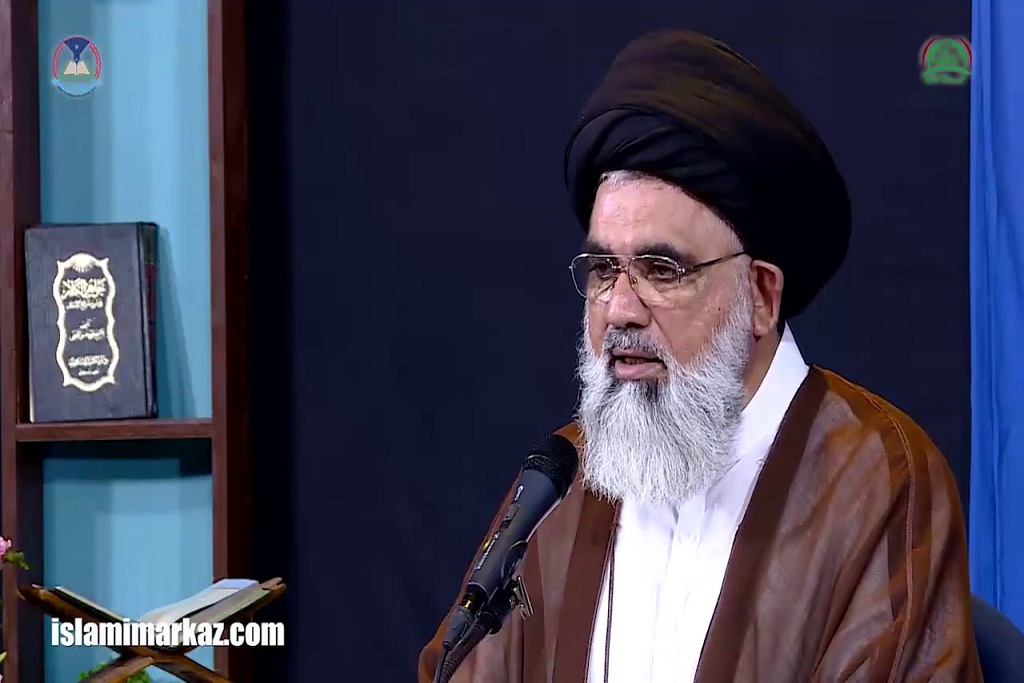Hujjatul Islam Ustad Syed Jawad Naqvi
(Principal Jamia Orwatul Wuthqa – Lahore)
Delivered at: Masjid Baitul ul Ateeq
Lahore – Pakistan
Friday Sermon – 13th December 2024
Sermon 1: Acquire Taqwa to protect yourself from those who distance you from the path of Allah
Sermon 2: Syria is back stabbing done by Erdogan and biggest betrayal of Muslim rulers
In Surah Anam,
قُلْ أَنَدْعُو مِنْ دُونِ اللَّهِ مَا لَا يَنْفَعُنَا وَلَا يَضُرُّنَا وَنُرَدُّ عَلَىٰ أَعْقَابِنَا بَعْدَ إِذْ هَدَانَا اللَّهُ كَالَّذِي اسْتَهْوَتْهُ الشَّيَاطِينُ فِي الْأَرْضِ حَيْرَانَ لَهُ أَصْحَابٌ يَدْعُونَهُ إِلَى الْهُدَى ائْتِنَا ۗ قُلْ إِنَّ هُدَى اللَّهِ هُوَ الْهُدَىٰ ۖ وَأُمِرْنَا لِنُسْلِمَ لِرَبِّ الْعَالَمِينَ {71}
Say: Shall we call on that besides Allah, which does not benefit us nor harm us, and shall we be returned on our heels after Allah has guided us, like him whom the Shaitans have made to fall down perplexed in the earth? He has companions who call him to the right way, (saying): Come to us. Say: Surely the guidance of Allah, that is the (true) guidance, and we are commanded that we should submit to the Lord of the worlds.
وَأَنْ أَقِيمُوا الصَّلَاةَ وَاتَّقُوهُ ۚ وَهُوَ الَّذِي إِلَيْهِ تُحْشَرُونَ {72}
And that you should keep up prayer and be careful of (your duty to) Him; and He it is to Whom you shall be gathered.
The verse indicates that individuals around us, such as parents, relatives, and elders, often try to guide us on ethical behavior and general threats. In today’s media-driven age, everyone seems to have advice on what to eat, buy, wear, and more. Many of the messages we receive on our phones serve as guidance, with people often referencing messages they’ve received or seen, acting on them without question—sometimes even regarding medical advice. Some individuals feel compelled to follow social media trends, believing that purchasing a product is essential just because they saw it online. Messages are often forwarded without verification, with little thought given to their validity.
Allah instructs the Prophet to remind people that the sacred and other entities they might turn to for guidance cannot provide any real benefits or harm. This suggests that idols, which cannot offer assistance, should not be worshipped. However, when it comes to human beings, they can indeed bring both harm and benefit. This is why people seek connections with kings, rulers, and politicians—to gain something. The Quran does not prohibit engaging with such figures simply because they can be beneficial or harmful. To think otherwise is to misunderstand the verse, as often happens among some speakers in religious settings. The essence of the verse is that one should not turn to anyone besides Allah, regardless of their potential to provide benefits or inflict harm. The criteria for seeking anything other than Allah isn’t based on harm or benefit; rather, the focus is on maintaining devotion to Allah alone. The reference to harm and benefit in the context of idol worship serves to illustrate the point, but the broader principle remains that one must not abandon Allah for anyone else.
To illustrate, if someone is instructed not to leave Lahore for Multan, choosing to go to Islamabad instead does not fulfill the requirement of staying in Lahore. The verse also mentions that Allah has guided individuals toward salvation, yet they later began encouraging other Muslims to revert to idol worship, claiming that the Prophet imposes too many restrictions on life, whereas idol worship seems less regulated. This inconsistency is deemed illogical, as they have turned away from guidance only to seek out misguidance again.
The concept of Shaitan, or Satan, can be misunderstood as an external entity solely focused on deceiving us. However, Shaitan embodies any influence that distances us from truth, Allah, and our essential duties. Those who lead us away from the right path often include acquaintances and relatives, rather than those who are distant or uninvolved in our lives. For instance, if someone reflects on their life and attributes their current situation to leaving school, they should recognize that it was often their own relatives who encouraged that decision. Recognizing these deceptive influences early is crucial, especially if someone suggests that the religious path is unimportant compared to pursuing a job. Such comments indicate that they are acting as Shaitan by discouraging one from engaging with religious teachings. Conversely, if a friend recommends a beneficial book, it is a sign of divine guidance.
Imam Hussain (a) in Dua e Arafa articulates how to recognize the blessings around us, noting that Allah had arranged for Islamic governance in Medina even before his birth. The means for guidance and misguidance are often presented by Allah, with misguidance being a product of Shaitan’s influence.
Moreover, the verse highlights how Shaitan can lead individuals to fall from their elevated status. Those who benefit from Allah’s means ascend to higher levels, but Shaitan seeks to undermine their achievements. As previously mentioned, the status following Prophethood is that of a Talib-e-Ilm (religious student)—not just those enrolled in a madrassa, but anyone earnestly seeking knowledge. During the Prophet’s time, people would balance their work with attending his teachings, achieving a revered status. However, Shaitan attempts to pull such students down by instilling desires for worldly pursuits. Allama Iqbal critiques the current educational system as a force that diverts aspirations toward materialism rather than knowledge, highlighting how Shaitan leads individuals away from higher ideals toward mediocrity.In Surah Araf, in verse 175
وَاتْلُ عَلَيْهِمْ نَبَأَ الَّذِي آتَيْنَاهُ آيَاتِنَا فَانْسَلَخَ مِنْهَا فَأَتْبَعَهُ الشَّيْطَانُ فَكَانَ مِنَ الْغَاوِينَ {175}
And recite to them the narrative of him to whom We give Our communications, but he withdraws himself from them, so the Shaitan overtakes him, so he is of those who go astray.
وَلَوْ شِئْنَا لَرَفَعْنَاهُ بِهَا وَلَٰكِنَّهُ أَخْلَدَ إِلَى الْأَرْضِ وَاتَّبَعَ هَوَاهُ ۚ فَمَثَلُهُ كَمَثَلِ الْكَلْبِ إِنْ تَحْمِلْ عَلَيْهِ يَلْهَثْ أَوْ تَتْرُكْهُ يَلْهَثْ ۚ ذَٰلِكَ مَثَلُ الْقَوْمِ الَّذِينَ كَذَّبُوا بِآيَاتِنَا ۚ فَاقْصُصِ الْقَصَصَ لَعَلَّهُمْ يَتَفَكَّرُونَ {176}
And if We had pleased, We would certainly have exalted him thereby; but he clung to the earth and followed his low desire, so his parable is as the parable of the dog; if you attack him he lolls out his tongue; and if you leave him alone he lolls out his tongue; this is the parable of the people who reject Our communications; therefore relate the narrative that they may reflect.
The Prophet is instructed to inform the people about an individual to whom Allah granted His signs, yet this person chose to distance himself from them. Had Allah wished, He would have certainly elevated him. However, Shaitan deceived him, causing him to descend to a lowly state, akin to that of a rabid dog. Shaitan represents anyone who causes you to fall from the esteemed status bestowed upon you by Allah. This individual, known as Balam Baur, was once held in high regard; even the Prophets of his time sought him for guidance in invoking Allah. The story recounts how his downfall began when he was approached by a woman for a discussion on a religious matter, which ultimately led him to compromise his dignity.
Returning to the verse from Surah An’am, it states that Shaitan confounds and misleads those who were once guided. These individuals, despite having understood the truth, became confused due to the lowliness that Shaitan introduced into their lives. Many who were once well-guided may embark on journeys—such as travel, Hajj, or Ziarat—but can be led astray by someone who distances them from the right path. Shaitan lurks on the road to the Kaaba, deceiving them. When their friends attempt to draw them back to the right path, they might claim to have found guidance elsewhere. In such instances, it is important to remind them that true guidance originates from Allah alone. The Prophet is then instructed to tell them that they are commanded to submit solely to the Lord of the worlds.
For such individuals, the command is to establish prayer (Salaat) and cultivate Taqwa. Taqwa serves as a safeguard against Shaitan’s attempts to undermine one’s courage, intentions, and determination. Without Taqwa, a person can easily fall prey to every whisper and become confused by various distractions. There are those who discourage and demotivate others—these are the Shaitan who seek to lead people away from Allah’s path. Taqwa will act as protection against such discouragement. It is vital to maintain your determination and not allow it to waver. Grounding your resolve in certainty is essential.
Those who find pleasure in people’s praise and fear their criticism are quick to feel discouraged. In contrast, those who remain indifferent to public opinion tend to maintain their determination; they take satisfaction not from external validation, but from their actions for Allah. If people do not accept them, it matters little, for if Allah accepts them, they are in a position of honor. Conversely, if the entire world praises someone but they remain lowly in the sight of Allah, they are akin to a rabid dog. May Allah protect us from such deceiving Shaitans.
SERMON 2
A person without Taqwa, like Balam Baur, loses his humanity; despite retaining his knowledge, he ultimately degrades to a state akin to a rabid dog. In Surah Jumah, Allah likens those who have received the Torah but fail to embody its teachings to donkeys. Similarly, Bani Israel were transformed into apes as a consequence of their actions. These examples from the Quran serve as stark reminders of the consequences of abandoning Taqwa, and we can witness even greater evidence of this in our current reality.
Take, for instance, the troubling situation in Gaza, which has persisted for fourteen months. In Syria, a tragic scene has unfolded where some Arab nations supported Israel, sending Takfirists alongside Zionists to undermine Bashar al-Assad’s government. Many in Pakistan and the broader Arab and Muslim world express relief at the overthrow of dictatorship in Syria, yet the reality is that many Arab rulers are just as dictatorial, if not worse, than Assad. While they celebrate events in Syria, they turn a blind eye to the suffering in Palestine, as if it were a distant drama unfolding next door. Turkish Muslims may rejoice over developments in Syria, but they remain silent about the ongoing bombings in Gaza, Rafah, and Khan Younis, where daily life is marked by violence and starvation. The Zionists keep the people of Gaza in a state of deprivation, only to announce food distribution in areas that are subsequently bombed.
This behavior reflects a profound lack of Taqwa. Just as the Quran describes Balam Baur as a rabid dog, we must ask what example we might cite for those who have ignored the oppression and barbarism faced by others. If these individuals truly embodied humanity, they would not have condoned the actions taken in Syria. The oppression faced by the Palestinians is severe and warrants urgent attention.
The Arab rulers, in their complicity, are worse than rabid dogs, as they show no desire to end the suffering in Palestine. Those who celebrate the situation in Syria are, in reality, providing significant support to Israel. It has been noted that while America is often seen as Israel’s biggest supporter, leaders like Bin Salman, the UAE, and Egypt have provided even greater assistance. The support that America could not provide on the ground has been facilitated by Erdogan, reflecting a betrayal of religious principles. This treachery stems from a lack of Taqwa.
The people of the Sabbath were also religious yet treacherous, which led Allah to transform them into apes as a form of humiliation. If Allah were to degrade these Arabs and Turks to the level of swine, it would be a testament to their moral decline, and even then, justice might not be served. Without Taqwa, humanity and mercy fade away, as we see in the indifference toward the oppressed people of Gaza, who are treated as if they are not human but rather pests.
An American writer has revealed that many Arabs have urged Israel to eliminate Hamas and Hezbollah, highlighting the dire state of moral integrity among those who should be advocates for justice. It is crucial to comprehend this scenario, as believers may feel overwhelmed by the weight of these events. Just as there were unexpected victories at Badr and defeats at Uhud, the path of Allah remains one of trials, yet success will ultimately come. Allah will grant victory to the oppressed, and those who engage in treachery will face disgrace in the light of the blood of martyrs.







